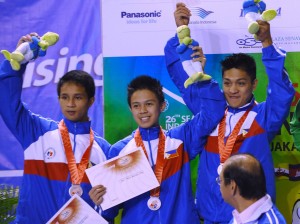PALEMBANG, Indonesia—A bruised, battered and shell-shocked Team Philippines continued to limp heading to the grand windup of the 26th Southeast Asian Games here.
A sluggish start and a sputtering finish have relegated the Filipinos to their worst showing in the biennial sports extravaganza that ends Tuesday, sliding from fifth in the previous 2009 SEA Games in Vientiane, Laos, to sixth overall this time.
The medal projections of both the Philippine Sports Commission and the Philippine Olympic Committee went off-target completely twice.
First, the PSC announced a benchmark of 70 golds and a top-three finish in the region’s biennial sporting showcase.
Then, as the golds came in trickles, POC officials focused on a new, lesser target: Improve on the Filipinos’ fifth-place overall finish in Laos.
With just a few events yet to be completed, there’s little chance the Philippines can surpass its 38-gold output in Vientiane, where only 215 athletes donned the national colors.
In these Games, though, Team Philippines fielded 527 athletes in 39 of the 42 sports calendared, more than a 100 of whom either shouldered their expenses or received corporate support.
It was in Nakhon Ratchasima, Thailand, in 2007 where the Filipinos plummeted to sixth overall, two years after ruling the 2005 Games back home with a hoard of 113-84-94.
In comparison, the Indonesians are assured of their 10th overall supremacy with a runaway 166-145-132 tally. Deposed champion Thailand is at second (104-90-117), Vietnam third (95-90-99).
Observers said it’s not the athletes’ fault that they have lagged behind in these Games.
The athletes have also improved, they said, but at a slower pace than their regional rivals, who enjoyed better funding, foreign training and international exposure courtesy of their respective governments, not to mention modern equipment and training facilities.
Internal strife and leadership disputes also bedevilled several national sports associations (NSAs) as politicking persisted among sports leaders.
Though the POC, headed by Jose “Peping” Cojuangco Jr., and the PSC, the government sports funding agency chaired by Richie Garcia, managed to work harmoniously, observers said the athletes benefited little from the good relationship.
The NSAs were either bereft of a comprehensive development program or did not have sufficient funds to pursue their blueprint for success, according to an official disgruntled by the power plays in his sport.
Many of the country’s traditional gold-medal wells dried up this time.
The Philippines floundered in medal-rich events like athletics, aquatic sports, shooting and gymnastics, which staked a total of 143 gold medals.
Aquatics, a sport mired in eternal leadership disputes back home, proved to be the biggest flop. Only one Filipino fin swimmer struck gold.
In all, 67 golds were staked in the aquatics disciplines of swimming, diving, fin swimming, water polo, open-water swimming and synchronized events.
The Filipinos were also shut out in shooting and gymnastics, which dangled a combined 30 golds.
Athletics staked a total of 46 golds in Jakarta, but the Filipinos settled for just two victories this time, plus nine silvers. The proud track-and-field contingent was the biggest contributor to the PH cause in Laos with seven golds.
The tennis squads, which contributed two golds in Laos, finally scored a breakthrough victory through the mixed pair of Denise Dy and Treat Huey on Monday.
Though the women boxers have seized two golds and are still in contention for two more Monday night, boxing is certain to miss its five-gold output in 2009.
The wrestlers have garnered two golds here, down from three in Vientiane, and the judokas settled for just a gold after bagging a pair two years ago.
Almost duplicating their 4-gold, 4-silver, 4-bronze output in Laos were the taekwondo jins, the most successful Filipino contingent thus far with a 4-3-5 tally.
Only the touted cue masters bettered their output, landing three golds, two silvers and four bronzes, up from a 3-1-2 harvest in 2009.
Team Philippines could have fared worse were it not for the surprise two golds from the bridge players, who paid their way to these Games, and the gold of wall climber Ina Flores.
For sure, the finger-pointing and buck-passing will begin even before these Games end.
Like in the past, recriminations will fly, and politicians will have plenty of ammunition to lash out at the most inept of the country’s sports officials.
But these won’t last long, the same disgruntled official predicted.
Once the stink of the Filipinos’ Games debacle is gone, he said, the nonperforming sports leaders will resurface again with grandiose new plans for redemption in the next SEA Games in Myanmar in 2013.
